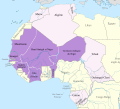Portal:Mauritania
The Mauritania Portal - بوابة موريتانيا
Mauritania, officially the Islamic Republic of Mauritania (Arabic: الجمهورية الإسلامية الموريتانية, al-Jumhūrīyah al-Islāmīyah al-Mūrītānīyah), is a sovereign country in Northwest Africa. It is bordered by the Atlantic Ocean to the west, Western Sahara to the north and northwest, Algeria to the northeast, Mali to the east and southeast, and Senegal to the southwest. By land area Mauritania is the 11th-largest country in Africa and 28th-largest in the world; 90% of its territory is in the Sahara. Most of its population of some 4.3 million lives in the temperate south of the country, with roughly a third concentrated in the capital and largest city, Nouakchott, on the Atlantic coast. The country's name derives from the ancient Berber kingdom of Mauretania in North Africa within the ancient Maghreb. Berbers occupied what is now Mauritania beginning in the third century AD. Arabs under the Umayyad Caliphate conquered the area in the late seventh century, bringing Islam, Arab culture, and the Arabic language. In the early 20th century, Mauritania was colonized by France as part of French West Africa. It achieved independence in 1960, but has since experienced recurrent coups and periods of military dictatorship. The most recent coup, in 2008, was led by General Mohamed Ould Abdel Aziz, who won subsequent presidential elections in 2009 and 2014. He was succeeded by Mohamed Ould Ghazouani following the 2019 elections, which were considered Mauritania's first peaceful transition of power since independence. Mauritania is culturally and politically part of the Arab world; it is a member of the Arab League and Arabic is the official language. The official religion is Islam, and almost all inhabitants are Sunni Muslims. Despite its prevailing Arab identity, Mauritanian society is multiethnic; the Bidhan, or so-called "white moors", make up 30% of the population, while the Haratin, or so-called "black moors", comprise 40%. Both groups reflect a fusion of Arab-Berber ethnicity, language, and culture. The remaining 30% of the population comprises various sub-Saharan ethnic groups. Despite an abundance of natural resources, including iron ore and petroleum, Mauritania remains poor; its economy is based primarily on agriculture, livestock, and fishing. Mauritania is generally seen as having a poor human rights record, and is particularly censured for the perpetuation of slavery as an institution within Mauritanian society, with an estimation by the 2018 Global Slavery Index of about 90,000 slaves in the country (or 2.1% of the population). (Full article...) Selected article -Slavery has been called "deeply rooted" in the structure of the northwest African country of Mauritania and estimated to be "closely tied" to the ethnic composition of the country, although it has also been estimated that "Widespread slavery was traditional among ethnic groups of the largely nonpastoralist south, where it had no racial origins or overtones; masters and slaves alike were black", despite the cessation of slavery across other African countries and an official ban on the practice since 1905. The French colonial administration declared an end to slavery in Mauritania in 1905. Mauritania ratified in 1961 the Forced Labour Convention, having already enshrined abolition of slavery, albeit implicitly, in its 1959 constitution. In 1981, Mauritania became the last country in the world to officially abolish slavery, when a presidential decree abolished the practice. However, no criminal laws were passed to enforce the ban. In 2007, under international pressure, the government passed a law allowing slaveholders to be prosecuted. Despite the official abolition of slavery, the 2018 Global Slavery Index estimated the number of slaves as 90,000 (or 2.1% of the population), a reduction from the 155,600 reported in the 2014 index in which Mauritania ranked 31st of 167 countries by total number of slaves and first by prevalence, with 4% of the population. The Mauritanian government ranks 121st of 167 in its response to all forms of modern slavery. In 2017, the BBC claimed that a total of 600,000 were living in slavery. A November 2009 United Nations mission headed by UN special rapporteur Gulnara Shahinian evaluated slavery practices in Mauritania. In an August 2010 report to the United Nations Human Rights Council (UNHRC), the mission concluded that "despite laws, programmes and difference of opinion with regard to the existence of slavery in Mauritania, ... de-facto slavery continues to exist in Mauritania." (Full article...)This is a Good article, an article that meets a core set of high editorial standards.
Mauritania sent a delegation to compete at the 2000 Summer Olympics in Sydney, Australia from 15 September to 1 October 2000. This was the African nation's fifth time competing at the Summer Olympic Games. The Mauritanian delegation consisted of two track and field athletes, Sidi Mohamed Ould Bidjel and Fatou Dieng. Neither advanced beyond the first round of their respective events. (Full article...) CategoriesGeneral images -The following are images from various Mauritania-related articles on Wikipedia.
Related portalsWikiProjects
Topics in MauritaniaCities and towns
CommunesAssociated WikimediaThe following Wikimedia Foundation sister projects provide more on this subject:
Discover Wikipedia using portals | ||||||||||||||||||||||||||||||||||||||||||||||||||||||||||||||||












































